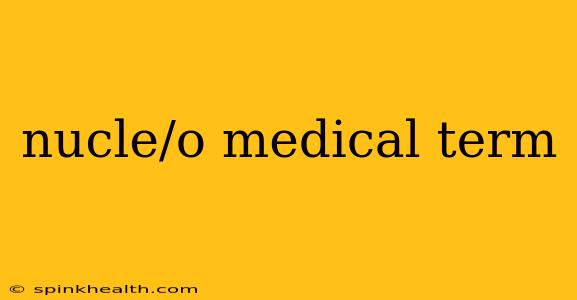The term "nucle/o" might seem intimidating at first glance, but it's actually a fundamental building block in medical terminology, hinting at a crucial part of the cell. This isn't just some obscure medical jargon; understanding "nucle/o" opens the door to comprehending a wide range of medical conditions and processes. Let's embark on a journey to decipher this word and explore its significance in the world of medicine.
Imagine a bustling city – that's what a cell is like, a complex system with various components working together. At the heart of this city lies the nucleus, the cell's control center. "Nucle/o," as a combining form, directly refers to this nucleus, the central and vital part of a cell that contains the genetic material – the DNA. Think of it as the city hall, dictating the cell's functions and activities.
What does nucle/o mean in medical terms?
In its simplest form, "nucle/o" means "nucleus" or "relating to the nucleus." This root word is often combined with other prefixes and suffixes to create more specific medical terms. For instance, "nucleolus" (nucle/o + olus – small) refers to a small, dense region within the nucleus involved in ribosome production. The significance of "nucle/o" stems from the nucleus's critical role in cell function, making it a crucial component in understanding various diseases and treatments.
What are some medical terms that use the prefix nucle/o-?
Many medical terms incorporate "nucle/o," each carrying a specific meaning related to the cell's nucleus. Let's explore a few examples:
-
Nucleoprotein: This term combines "nucle/o" with "protein," indicating a protein found within the cell's nucleus. These proteins are integral to the structure and function of DNA and play a vital role in gene expression.
-
Nucleocytoplasmic: This refers to the relationship between the nucleus and the cytoplasm (the jelly-like substance surrounding the nucleus). This term is frequently used in describing cellular processes and conditions impacting both regions of the cell.
-
Nucleolar: As mentioned earlier, "nucleolar" specifically refers to the nucleolus, a critical structure within the nucleus responsible for creating ribosomes, which are the protein-making machinery of the cell.
How is nucle/o related to diseases?
The nucleus's importance extends to the realm of diseases. Many illnesses stem from dysfunction within the cell's nucleus, highlighting the significance of "nucle/o" in medical diagnosis and understanding:
-
Nuclear Medicine: This branch of medicine utilizes radioactive isotopes to diagnose and treat various diseases. Many nuclear medicine procedures target cellular processes occurring within the nucleus.
-
Cancer: Many cancers originate from uncontrolled cell growth and division, often due to mutations in the genetic material housed within the cell nucleus. Understanding nuclear processes is crucial for cancer research, diagnosis, and treatment.
-
Genetic Disorders: Numerous genetic disorders result from defects or mutations in the DNA found within the cell's nucleus. The study of these disorders often involves examining the structure and function of the nucleus.
What are some examples of words that start with nucle-?
While "nucle/o" is often used as a combining form, "nucle-" can also act as a prefix in certain medical contexts. You might encounter terms like:
-
Nucleic Acid: The fundamental building blocks of DNA and RNA, crucial for genetic information storage and transfer.
-
Nucleosome: The basic structural unit of chromatin, which packages DNA into a compact form within the cell's nucleus.
Conclusion: The Central Role of Nucle/o in Medicine
Understanding the medical term "nucle/o" opens a window into the intricate world of cellular biology and its relevance to various diseases and medical treatments. From cancer research to genetic disorders, grasping the function and significance of the cell nucleus is paramount. By deciphering this fundamental word, we gain a better appreciation for the complexities of human biology and the ongoing advancements in medical science. This knowledge empowers medical professionals to better diagnose, understand, and treat a wide range of conditions.

